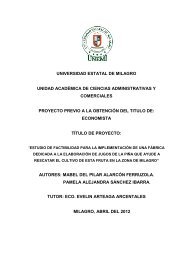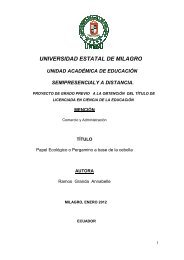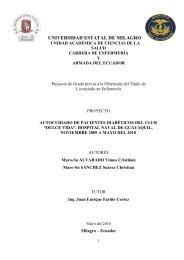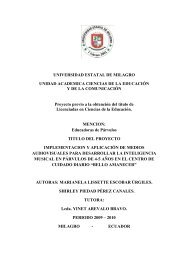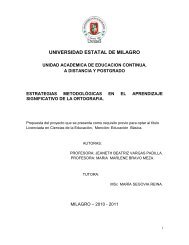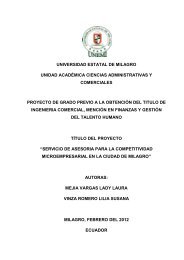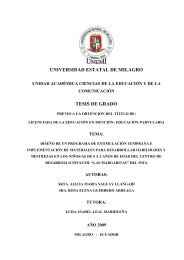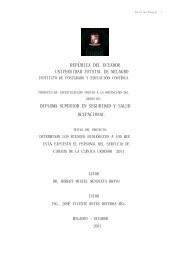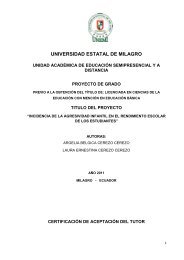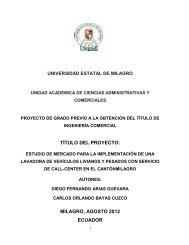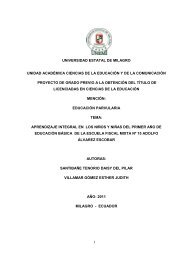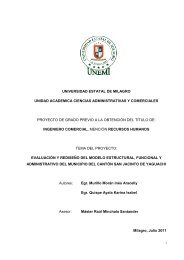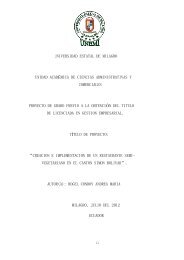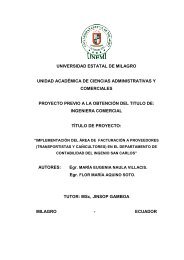capitulo i - Repositorio de la Universidad Estatal de Milagro - Unemi
capitulo i - Repositorio de la Universidad Estatal de Milagro - Unemi
capitulo i - Repositorio de la Universidad Estatal de Milagro - Unemi
You also want an ePaper? Increase the reach of your titles
YUMPU automatically turns print PDFs into web optimized ePapers that Google loves.
Teoría / Exponente Perspectiva <strong>de</strong> <strong>la</strong><br />
adolescencia<br />
Teoría psicosexual <strong>de</strong><br />
Freud<br />
Teoría psicosocial <strong>de</strong><br />
Erikson<br />
Teoría aprendizaje social<br />
<strong>de</strong> Bandura<br />
Teoría Cognoscitiva <strong>de</strong><br />
Piaget<br />
Teoría <strong>de</strong>sarrollo moral<br />
<strong>de</strong> Kohlberg<br />
Teoría razonamiento<br />
moral <strong>de</strong> Hostos<br />
Teoría motivacional o <strong>de</strong><br />
jerarquía <strong>de</strong> necesida<strong>de</strong>s<br />
<strong>de</strong> Maslow<br />
Cambios físicos que<br />
<strong>de</strong>spiertan <strong>la</strong> sexualidad.<br />
Uso <strong>de</strong> <strong>la</strong>s etapas<br />
Sí (Oral, Anal, Fálica,<br />
Latente y Genital)<br />
Búsqueda <strong>de</strong>l yo Sí (8 etapas <strong>de</strong> confianza<br />
vs <strong>de</strong>sconfianza)<br />
Imitación moral y búsqueda<br />
<strong>de</strong>l yo.<br />
Conocimiento mediante<br />
operaciones formales.<br />
Imitación moral y búsqueda<br />
<strong>de</strong>l yo.<br />
Uso <strong>de</strong> <strong>la</strong> razón mediante <strong>la</strong><br />
inducción.<br />
Cambios físicos, búsqueda<br />
<strong>de</strong>l yo, <strong>de</strong>spertar <strong>de</strong> <strong>la</strong><br />
sexualidad, pensamiento<br />
abstracto y razonamiento.<br />
No (Cree que el <strong>de</strong>sarrollo<br />
<strong>de</strong>pen<strong>de</strong> <strong>de</strong>l conocimiento<br />
mediante mo<strong>de</strong><strong>la</strong>je)<br />
Sí (Sensoriomotriz,<br />
preoperacional, operación<br />
concreta y operación<br />
formal)<br />
Sí (preconvencional,<br />
convencional y<br />
posconvencional)<br />
Sí (infantil, adolescencia,<br />
juvenil y adultez)<br />
No (Cree en el <strong>de</strong>sarrollo<br />
<strong>de</strong> <strong>la</strong>s potencialida<strong>de</strong>s<br />
mediante el alcance <strong>de</strong><br />
metas)<br />
Aunque los cambios físicos son evi<strong>de</strong>ntes al pasar <strong>de</strong> los años son Freud y Maslow<br />
quienes los toman en consi<strong>de</strong>ración como muestra evi<strong>de</strong>nte <strong>de</strong> <strong>la</strong> etapa <strong>de</strong> <strong>la</strong><br />
adolescencia. Estos cambios son cuantitativos y observables y son <strong>de</strong>terminantes<br />
c<strong>la</strong>ros <strong>de</strong>l proceso <strong>de</strong>l <strong>de</strong>sarrollo. Ambos piensan que con los cambios físicos se<br />
<strong>de</strong>spierta <strong>la</strong> sexualidad <strong>de</strong>l individuo y éste se concentra más en los <strong>de</strong>seos y<br />
emociones sexuales que en el medio ambiente que les ro<strong>de</strong>a.<br />
Sin embargo para Erikson, Kohlberg y Maslow <strong>la</strong> adolescencia es <strong>la</strong> etapa <strong>de</strong>l<br />
<strong>de</strong>sarrollo en que el individuo se busca a sí mismo y tiene <strong>la</strong> necesidad <strong>de</strong> conocerse<br />
en todas sus potencialida<strong>de</strong>s. Esta búsqueda <strong>de</strong> sí mismo lo llevará a aumentar su<br />
autoestima y po<strong>de</strong>r competir con sus grupos <strong>de</strong> pares en un bienestar común. Ellos<br />
38



